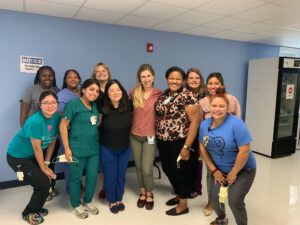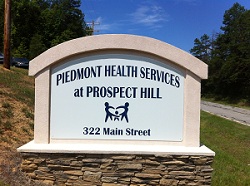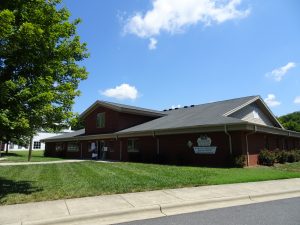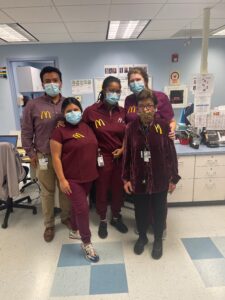The FQHC Track
The UNC Department of Family Medicine is committed to providing high quality health care to vulnerable and under resourced populations. For residents interested in expanded training in caring for rural populations, as well as under resourced populations with an emphasis on Latino Health and Spanish-speaking patients, we offer the FQHC Track.
The Program
The FQHC Track provides residents with their continuity experience at a Federally Qualified Health Center and the opportunity to work with a higher volume of Spanish speaking patients and rural populations. The FQHC Track is an exceptional opportunity for residents interested in a career focused on: the care of underserved/under resourced populations, engagement in community health, and innovation and leadership in health care delivery.
The FQHC Track is designed for residents looking to enhance their competency in caring for diverse patient populations that have often experienced significant health disparities. Residents pursuing the FQHC Track will gain a deeper knowledge of the social determinants of health and explore potential remedies that address these issues on a local, regional, and national scale.
Hear from some of our past and current residents!
Residents in the FQHC Track participate in our core residency program and are exposed to the same curriculum and rotations as all University track residents. However, they will have their continuity clinic experience in a rural Federally Qualified Health Center (instead of the UNC Family Medicine Center) that serves a large Spanish-speaking population (see below sites).

Prospect Hill Community Health Center
Prospect Hill Community Health Center served as the original site of the Rural Health Track, with residents first seeing patients in this location starting in 2013. Prospect Hill Community Health Center (PHCHC) is a Federally Qualified Community Health Center located in a rural, medically underserved area 27 miles northeast of Chapel Hill. Of the two sites in the FQHC Track, PHCHC is the less urban. Caswell county boasts a population of 22,600, including 22.1% elderly, with 13.2% of residents uninsured, and 17.1% living below the poverty level. In addition, 45.7% of residents were not in the labor force, as compared to 38.7% of North Carolina residents.
A few things to know about the Prospect Hill:
- PHCHC is the oldest community health center in North Carolina, with over 40 years of service to its surrounding community.
- PHCHC serves a diverse population of over 50% Spanish speaking patients, and has a busy maternal child health program, as well as a Farm Worker Outreach program.
- The clinic has an onsite Pharmacy, Dental Clinic, WIC program, Integrated Behavioral Health and Social Worker.
- The clinic performs Point-of-Care Ultrasound with a dedicated MSK Ultrasound Procedures clinic and routine Third Trimester OB US.
- Additionally there is a Long Acting Reversible Contraception (LARC) clinic that provides free contraception to our patients.
- PHCHC opened a renovated 4,000-square-foot facility in June 2011, and the health center has a dedicated group of faculty and support staff.
- There is a specialty procedures clinic which offers MSK injections with ultrasound guidance, special dermatologic procedures, and additional ultrasound guided procedures.
Siler City Community Health Center
Siler City Community Health Center is our newest site for the FQHC Track, where residents first began seeing patients in 2019. Siler City Community Health Center (SCCHC) is a Federally Qualified Community Health Center located in a rural, medically underserved town 34 miles southwest of Chapel Hill. Siler City is a working-class community that was named the 2015 North Carolina Small Town of The Year. SCCHC is located in a neighborhood setting, one block from the high school, and next door to the health department and a mental health center. SCCHC is very closely integrated with Chatham Hospital, a community based critical access hospital where residents also spend time. As of 2019 estimated data, 13.4% of Chatham County residents were uninsured, and in Siler City, 26.9% of the population live below the poverty level. The Hispanic-Latino population of Siler City is 42.5%. 
A few things to know about SCCHC:
- Siler City opened in 2002 to serve Chatham, Randolph, and surrounding counties and has a dedicated group of faculty and support staff.
- SCCHC serves a diverse population with over 50% Spanish speaking patients and has a busy maternal child health program.
- The clinic is located in close proximity to Chatham Hospital, which is fully staffed by our departmental family medicine faculty.
- The clinic has an onsite Pharmacy, Dental Clinic, WIC program, Integrated Behavioral Health, nutrition services, and a Social Worker.
- We perform Point-of-Care Ultrasound with routine MSK procedures and first and third Trimester OB US.
- There is a specialty procedures clinic which offers MSK injections with ultrasound guidance, special dermatologic procedures, and additional ultrasound guided procedures.
Spanish Curriculum
An important part of our commitment to working in rural areas is acknowledging the social and cultural frameworks that shape the health of our patients. Nearly 20% of the US population identify as Hispanic or Latino and 13% of the US population speaks Spanish at home. In order to provide culturally informed care for our increasingly diverse population, we support our residents in developing Spanish language skills as part of their preparation for practice, recognizing the influence of language on patient care outcomes. Our Spanish language curriculum includes an intensive weekend workshop, individual assessment and coaching, didactic sessions focused on clinical cases, and live interpreting during clinical care. Our aim is for residents to graduate with necessary language competency to work independently or with at-the elbow support in their future practice. The balance of learning clinical care and language can be challenging, but we have seen great success among our residents and continue to advocate to develop this skill during residency so that language proficiency does not become a limiting factor for track applicants.
Resources
https://usafacts.org/articles/demographics-hispanic-americans/
Cano-Ibáñez N, Zolfaghari Y, Amezcua-Prieto C, Khan KS. Physician-Patient Language Discordance and Poor Health Outcomes: A Systematic Scoping Review. Front Public Health. 2021 Mar 19;9:629041. doi: 10.3389/fpubh.2021.629041. PMID: 33816420; PMCID: PMC8017287.
Applying to the FQHC Track
The FQHC Track has a separate match number from our university program (where residents have their continuity clinics at the UNC Family Medicine Center). The separate match numbers allow applicants to rank their preferred site for their continuity practice. Spanish language proficiency is preferred, but not required, for participation in the FQHC Track. We encourage all applicants to the FQHC Track to apply to our university program also. Through our university program, residents gain experience caring for underserved populations in our UNC Family Medicine Center.

Updated July 2023
